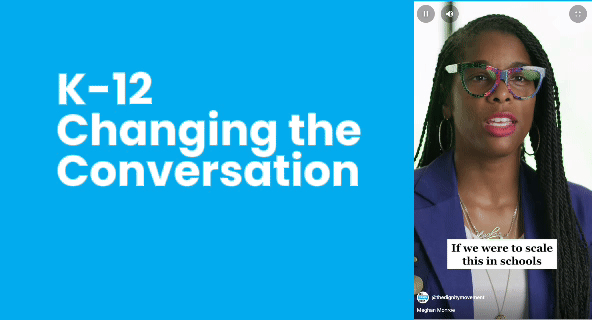Cultivating a Culture of Dignity in Schools
By: Meghan Monroe
Pictured above: Iradukunda Esperance, Students for Dignity Ambassador
Much of the growth in our work here at UNITE has been happening in the K-12 education space. Teachers and school leaders across the country are asking how they can uphold and promote the value of dignity within our schools.
Dignity, at its core, is about recognizing the inherent worth of every individual—students, educators, families, and all stakeholders. The challenge is to foster an environment in our schools where mutual respect, compassion, and understanding are not just ideals but daily practices.
During these highly polarized times, stress and uncertainty can easily permeate our schools. The current climate often presents challenges that can undermine our sense of shared humanity. However, it is precisely within these challenges that dignity can serve as a grounding force. Whether dealing with difficult conversations, navigating diverse perspectives, or managing individual and collective struggles, dignity ensures that all voices are heard and valued.
For educators, this means creating classroom environments where students feel safe, seen, and respected. For students, it’s about learning how to interact with kindness and empathy toward one another. And for families, dignity means supporting these principles at home, so they can be carried forward into the school environment.
To guide us in the work of enhancing school climate through the principles of dignity, our team has just released an adapted version of the Dignity Index – the Youth Edition. This adapted version is designed for students in grades K-8, with an abbreviated scale for students in K-3.
Each level of the scale has been modified with language that is developmentally appropriate to young people, with an eye to the types of situations students face in the school environment. For example, a THREE changes from “We’re the good people and they’re the bad people. It’s us vs. them,” to “We’re the good people and they’re the bad people. We’re always right, and they’re always wrong.”
A SEVEN changes from “We fully engage with the other side, discussing even values and interests we don’t share, open to admitting mistakes or changing our minds,” to “We want to know the other person’s side. We’re willing to learn new things, admit mistakes, or change our minds.”
The skill-building suggestions on the reverse side of the scale remain the same in principle, with slight edits to the language used to describe key practices that can help embed dignity into the very fabric of our school communities.
The Youth Edition of the Dignity Index can be applied to the programs and practices already happening in schools, like those promoting Active Listening and Empathy, which encourage open dialogue where everyone—educators, students, and parents—feels heard, affirming the dignity of each person; Restorative Practices, which help rebuild relationships and address conflicts with dignity, compassion, and understanding; and Inclusive Resources, which recognize the diverse perspectives and cultural backgrounds students bring to school, and teach that “each one of us is precious and irreplaceable, so we should treat each other with dignity, no matter what.”
Of course the concept of dignity is not confined to the classroom. In fact, the most transformative practices begin in our homes. Schools can play a crucial role in supporting the family’s role in nurturing the dignity mindsets and practices that their children bring to the classroom.
We are excited about this new Youth Edition of the Dignity Index and the growing interest in dignity as a tool to improve the culture of our schools. By taking simple but powerful steps—listening, understanding, respecting—we can create a space where every student, educator, and family member thrives.
Meghan Monroe
Senior Program Associate
K-12 Education
Watch Meghan Discuss The Index in Schools 🎥
The Dignity Movement in Action
Have you heard the news?! We’re partnering with The University of Utah to expand the reach of The Dignity Index! This collaboration will advance research, education, and real-world training on dignity in public discourse. The momentum is growing—let’s change the conversation together!
Tami was in South Carolina presenting to members of the SC State School Boards Association. She bumped into a former Utah teacher and caught up with a high school friend from Montana!
On Monday, Karren brought the Dignity Index to the faculty and staff at MidAmerica Technology Center—a leading tech and vocational school for high school and college students in Oklahoma. The energy in the room was incredible! The staff were fully engaged, asked insightful questions, and shared amazing perspectives. Big thanks to everyone who participated!
Maddie and Ira promoted the growing interest in our high school Students for Dignity clubs at a community fair in Southern Utah.
Spread the Word: Share and Engage
The conversation around dignity is growing, and sharing this newsletter helps bring more people into it. When we challenge contempt and focus on dignity, we create space for real change. If this resonates with you, share this on Facebook and invite others to join the conversation.
Follow us on Instagram (@thedignityindex) for more ways to engage. Every share helps shift the narrative—let’s keep it going!







